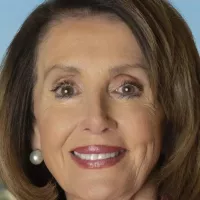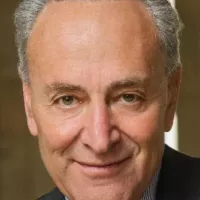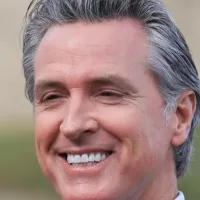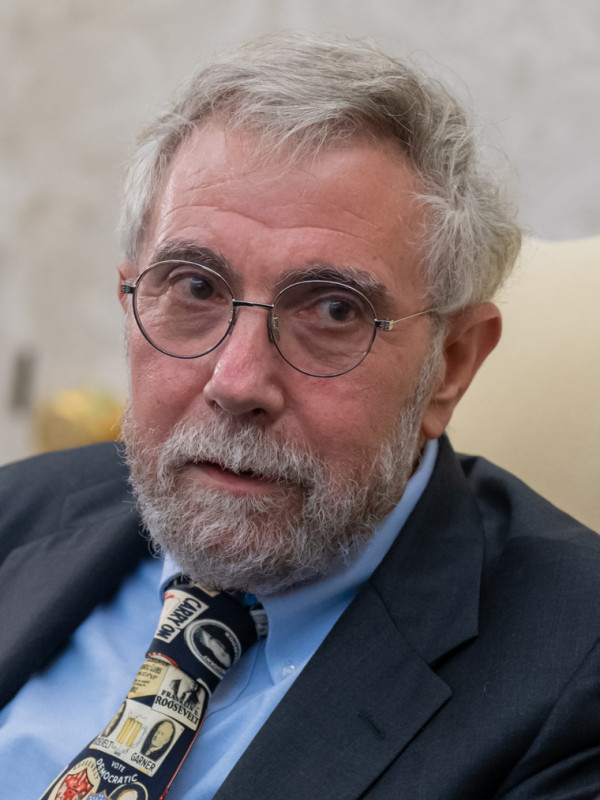From career breakthroughs to professional milestones, explore how Paul Krugman made an impact.
Paul Krugman is a New Keynesian economist and Distinguished Professor at the City University of New York's Graduate Center. He is renowned for his contributions to new trade theory and new economic geography, which earned him the 2008 Nobel Prize in Economic Sciences. His work explains international trade patterns and the geographic distribution of economic activity, considering economies of scale and consumer preferences. He was a columnist for The New York Times from 2000 to 2024, using his platform to discuss and critique economic policies and events.
1967: Krugman's Criticism of Galbraith's "The New Industrial State"
Paul Krugman has been critical of some Post-Keynesian economists such as John Kenneth Galbraith, Krugman referred to Galbraith's 1967 work "The New Industrial State" as not "real economic theory".
September 1977: Assistant Professor at Yale University
In September 1977, Paul Krugman became an assistant professor at Yale University.
1977: Completion of PhD at MIT
In 1977, Paul Krugman completed his PhD in economics from the Massachusetts Institute of Technology (MIT) with a thesis titled 'Essays on flexible exchange rates'.
1977: Dixit-Stiglitz Paper
Paul Krugman modeled a 'preference for diversity' by assuming a CES utility function like that in a 1977 paper by Avinash Dixit and Joseph Stiglitz.
1978: Development of Monopolistically Competitive Trade Model
In 1978, Paul Krugman, encouraged by Rudi Dornbusch, developed a monopolistically competitive trade model, which he considered a key moment in his career. In that same year, Krugman wrote “The Theory of Interstellar Trade”.
1979: Joins MIT Faculty
In 1979, Paul Krugman joined the faculty at MIT.
1979: Paper on Currency Crises
In 1979, Paul Krugman wrote a paper on currency crises in the Journal of Money, Credit, and Banking, showing that misaligned fixed exchange rate regimes are likely to end in a sudden speculative attack.
1979: Paper in the Journal of International Economics
In 1979, Paul Krugman's paper in the Journal of International Economics proposed an explanation of trade between similar countries, based on consumer preference for diverse brands and economies of scale in production.
1979: Research Associate at NBER
Since 1979, Paul Krugman has been a research associate at the National Bureau of Economic Research.
1981: Krugman on Reagan's tax policies
After the 2016 elections and Trump's move towards protectionism, Paul Krugman wrote that protectionism can make economies less efficient, but would not directly cause recessions. He advised against repeating Reagan's 1981 policy on taxes and quotas on imported products.
1982: Staff Member at Reagan White House
From 1982 to 1983, Paul Krugman worked at the Reagan White House as a staff member of the Council of Economic Advisers.
1983: Staff Member at Reagan White House
From 1982 to 1983, Paul Krugman worked at the Reagan White House as a staff member of the Council of Economic Advisers.
1984: Rejoins MIT as Full Professor
In 1984, Paul Krugman rejoined MIT as a full professor.
1987: Krugman on Free Trade and Comparative Advantage
In 1987, Paul Krugman quipped about an "Economist's Creed" affirming understanding of comparative advantage and advocacy for free trade. He argued free trade had shifted from optimum to reasonable rule of thumb.
1987: Krugman's Criticism of Galbraith's "Economics in Perspective"
Paul Krugman has been critical of some Post-Keynesian economists such as John Kenneth Galbraith, Krugman referred to Galbraith's 1987 work "Economics in Perspective" as "remarkably ill-informed".
1990: Publication of "The Age of Diminished Expectations"
In 1990, Paul Krugman wrote "The Age of Diminished Expectations", discussing increasing US income inequality in the 'New Economy' of the 1990s.

1991: Publication of "Increasing Returns and Economic Geography"
In 1991, Paul Krugman published "Increasing Returns and Economic Geography" in the Journal of Political Economy, a seminal paper that began the development of the 'new economic geography'.
1992: Praise for Bill Clinton's economic plan and consideration for a role in the administration
During the 1992 presidential campaign, Paul Krugman praised Bill Clinton's economic plan in The New York Times. Clinton's campaign used Krugman's work on income inequality. While it was considered likely that Clinton would offer him a position in the new administration, Krugman's volatility and outspokenness led Clinton to look elsewhere.
1992: Shift from Academic to Public Intellectual
Economist J. Peter Neary noted that starting in 1992, Paul Krugman transitioned from being an academic superstar to a public intellectual, explaining economic principles to a wide audience through extensive writings, including a regular column for The New York Times, monographs, textbooks, and books on economics and current affairs.
1994: Krugman's Criticism of National Competitiveness
In 1994, Paul Krugman criticized the notion of national competitiveness, noting that a country's economic success does not need to come at the expense of a rival nation.
1994: Foreign Affairs Article on East Asian Economic Growth
In a 1994 Foreign Affairs article, Paul Krugman argued that the economic successes of the East Asian 'tigers' were not an economic miracle but rather were fueled by mobilizing resources, and that their growth rates would inevitably slow. His article helped popularize the argument that the growth of economies in East Asia was not the result of new and original economic models, but rather from high capital investment and increasing labor force participation.
1996: Writing for Slate
Beginning in 1996, Paul Krugman wrote for Slate (1996–99), critiquing commonly held positions on economic issues, from protectionism to supply-side economics. During that period, he also wrote for Fortune.
1996: Krugman Compares Opposition to Free Trade to Opposition to Evolution
In 1996, Paul Krugman likened opposition against free trade and globalization to the opposition against evolution via natural selection.
1997: Writing for Fortune
Beginning in 1997, Paul Krugman wrote for Fortune (1997–99), critiquing commonly held positions on economic issues, from protectionism to supply-side economics. During that period, he also wrote for Slate.
1997: Advocacy for Currency Controls During Asian Financial Crisis
During the 1997 Asian financial crisis, Paul Krugman advocated currency controls as a way to mitigate the crisis, suggesting exchange controls as "a solution so unfashionable, so stigmatized, that hardly anyone has dared suggest it".
1998: Krugman Dismisses the Case for Living Wages
In 1998, Paul Krugman dismissed the case for living wages.
1998: Skepticism of Technology-Driven Progress
In 1998, during the dot-com bubble, Paul Krugman wrote a commentary for Red Herring expressing skepticism about optimistic predictions for technology-driven progress.
1999: Joining The New York Times as a Columnist
In 1999, The New York Times approached Paul Krugman to write a bi-weekly column on business and economics. His first columns in 2000 addressed business and economic issues, but as the 2000 US presidential campaign progressed, Krugman increasingly focused on George W. Bush's policy proposals.
2000: Trump's Claim About Krugman's Market Call
After Trump gave Paul Krugman a 'Fake News Award', Krugman stated "I get a 'fake news award' for a bad market call, retracted 3 days later, from 2000-lie man, who still won't admit he lost the popular vote. Sad!"
2000: Krugman Argues Against Support for Ethanol
In 2000, Paul Krugman argued against mandates, subsidies, and tax breaks for ethanol.
2000: Krugman joins The New York Times
In 2000, Paul Krugman became a columnist for The New York Times, a position he held until 2024.
2000: Joins Princeton University
In 2000, Paul Krugman joined Princeton University as Professor of Economics and International Affairs.
2000: Focusing on George W. Bush's Policy Proposals in Columns
Starting in 2000, Paul Krugman focused on George W. Bush's policy proposals in his New York Times columns. Krugman accused Bush of misrepresenting his proposals and criticized the proposals themselves.
2002: Described as having a "missionary quality" to his writing
In 2002, Alan Blinder described Paul Krugman as having a "missionary quality" to his writing, saying that he was trying to stop something using the power of the pen. Nicholas Confessore called Krugman "the most important political columnist in America."
September 2003: Publication of "The Great Unraveling"
In September 2003, Paul Krugman published "The Great Unraveling," a collection of his columns criticizing the Bush administration's economic and foreign policies and their impact on the US economy in the early 2000s. The book argues that the Bush administration's policies, such as tax cuts for the rich and the Iraq War, led to unsustainable deficits.
2003: Krugman on Skepticism and the Iraq Debacle
In 2003, Paul Krugman opposed the invasion of Iraq. He wrote in his New York Times column that the Iraq debacle taught to always be skeptical and never rely on supposed authority.
2003: Krugman Questions Usefulness of Crewed Space Flights
In 2003, Paul Krugman questioned the usefulness of NASA's crewed space flights given the technology and their high financial cost.
2005: Predicted Limited Impact of the Internet
Around 2005, Paul Krugman predicted that the Internet's impact on the economy would be no greater than that of the fax machine, and that the number of jobs for IT specialists would decline.
2006: Krugman on the Impact of Immigration on Wages
In 2006, Paul Krugman wrote that immigration reduces the wages of domestic workers who compete with immigrants due to increased supply, estimating a fiscal burden of 0.25% of GDP.
2007: Publication of "The Conscience of a Liberal"
In 2007, Paul Krugman published "The Conscience of a Liberal", detailing the history of wealth and income inequality in the United States during the 20th century. Krugman contends that government policies significantly influenced the reduction of inequality from the 1930s to 1970s, and the subsequent increase from the 1980s onward, criticizing the Bush administration's policies for exacerbating the wealth gap.
October 5, 2008: Announces International Finance Multiplier
On October 5, 2008, Paul Krugman announced on his blog that he was working on an "international finance multiplier" model to explain the speed of the global financial crisis.
2008: Krugman on the 2008 financial crisis
According to Paul Krugman, Gordon Brown and his party were unfairly blamed for the 2008 financial crisis.
2008: Krugman Wins Nobel Prize
In 2008, Paul Krugman was awarded the Nobel Memorial Prize in Economic Sciences for his contributions to new trade theory and new economic geography. The Prize Committee cited Krugman's work explaining the patterns of international trade and the geographic distribution of economic activity, by examining the effects of economies of scale and of consumer preferences for diverse goods and services.
2008: Awarded Nobel Prize in Economics
In 2008, Paul Krugman was awarded the Nobel Memorial Prize in Economic Sciences for his work associated with New Trade Theory and the New Economic Geography.
2008: Publication of "The Return of Depression Economics and the Crisis of 2008"
In late 2008, Krugman published an updated version of "The Return of Depression Economics and the Crisis of 2008", where he analyzed the causes of the global financial crisis and the failure of the United States regulatory system to adequately oversee a rapidly evolving financial system.
2008: Keynesian Resurgence
Krugman was one of the most prominent advocates of the 2008–2009 Keynesian resurgence.
December 2009: Krugman's Criticism of Obama's Job Summit
In December 2009, in anticipation of President Obama's Job Summit, Paul Krugman stated in a Fresh Dialogues interview that the proposal needed to be significant, suggesting something like $300 Billion, as anything less would be viewed as a joke.
2009: Changing missionary zeal in the post-Bush era
In late 2009, Paul Krugman described the Obama administration as "good guys but not as forceful as I'd like", saying that his missionary zeal had changed in the post-Bush era and he was trying to make the progressive moment in American history a success.
2009: Keynesian Resurgence
Krugman was one of the most prominent advocates of the 2008–2009 Keynesian resurgence.
April 2010: Krugman's Argument for Financial Regulation and Taxation
In April 2010, as the Senate considered new financial regulations, Paul Krugman argued that the regulations should regulate financial innovation and tax financial industry profits. He cited a paper that concluded that innovation provided "false substitutes" for traditional assets, leading to financial fragility.
June 28, 2010: Krugman's Criticism of Global Deficit Reduction Agreement
On June 28, 2010, Paul Krugman criticized world leaders for agreeing to halve deficits by 2013, claiming these efforts could lead the global economy into a "third depression". He advocated for continued economic stimulus.
2010: President of the Eastern Economic Association
In 2010, Paul Krugman served as President of the Eastern Economic Association.
2010: Krugman Urges British Voters to Not Support Conservative Party
In 2010, Paul Krugman urged British voters not to support the opposition Conservative Party in the general election, criticizing their leader David Cameron.
2011: Criticism of Bitcoin Begins
In 2011, Paul Krugman started to voice criticism of Bitcoin, arguing against its economic soundness.
2011: Favorite Living Economist Under 60
In 2011, a survey of economics professors named Paul Krugman their favorite living economist under the age of 60.
June 2012: Launch of "A manifesto for economic sense"
In June 2012, Paul Krugman and Richard Layard launched "A manifesto for economic sense", calling for greater use of fiscal stimulus policy to reduce unemployment and foster growth.
2012: Publication of "End This Depression Now!"
In 2012, Krugman published "End This Depression Now!", where he argued against austerity measures, asserting that fiscal cuts deplete valuable funds and worsen the economy. He posited that stimulating the economy through private or public sectors is crucial to avoid prolonging economic depression and it's imperative to cut debt only when the economy is near full-employment.
2012: Krugman Praises Peter Beinart’s 'The Crisis of Zionism'
In 2012, Paul Krugman praised Peter Beinart’s The Crisis of Zionism as a "brave book," criticizing the policies of Benjamin Netanyahu’s government.
2013: Krugman Reflects on Past Predictions
In 2013, Paul Krugman stated that his predictions about the Internet's impact were intended to be "fun and provocative" rather than careful forecasts.
2013: G-20 Toronto Summit deficit reduction targets
In his June 28, 2010 column in The New York Times, Paul Krugman criticized world leaders for agreeing to halve deficits by 2013 at the recent G-20 Toronto Summit. Krugman claimed that these efforts could lead the global economy into the early stages of a "third depression" and leave "millions of lives blighted by the absence of jobs". He advocated instead the continued stimulus of economies to foster greater growth.
February 2014: Announcement of Retirement from Princeton
In February 2014, Paul Krugman announced that he would be retiring from Princeton University in June 2015 and joining the faculty at the Graduate Center of the City University of New York.
2014: Krugman's "Second Gilded Age" Statement
In 2014, Paul Krugman stated in a review of Thomas Piketty's Capital in the Twenty-First Century that we are in a Second Gilded Age.
June 2015: Departure from Princeton University
In June 2015, upon retiring from Princeton after fifteen years, Paul Krugman explained in his column that he wished to reside in New York City and focus more on public policy issues. Subsequently, he became a professor at the Graduate Center of the City University of New York.
2015: Krugman's Ambivalence About the Trans-Pacific Partnership
In 2015, Paul Krugman expressed ambivalence about the Trans-Pacific Partnership, stating that it was not mainly about trade and most of the benefits of free trade had already been realized by existing agreements.
January 19, 2016: Criticism of Bernie Sanders' Presidential Campaign
On January 19, 2016, Paul Krugman criticized Bernie Sanders' presidential campaign for a perceived lack of political realism, comparing Sanders' plans for healthcare and financial reform unfavorably to those of Hillary Clinton.
2016: Krugman on Protectionism and Trade Wars
After the 2016 elections and Trump's move towards protectionism, Paul Krugman wrote that protectionism can make economies less efficient, but would not directly cause recessions. He advised against repeating Reagan's 1981 tax and quota policies on imported products, recommending against the abandonment of NAFTA.
2016: Krugman Endorses Hillary Clinton
In 2016, Paul Krugman endorsed Democratic candidate Hillary Clinton in the run-up to the U.S. presidential election.
2016: Krugman's Incorrect Market Prediction After Trump's Election
On election night in 2016, Paul Krugman wrongly predicted in a New York Times op-ed that the markets would never recover under Trump and stated "first-pass answer is never", but retracted the call in the same publication three days later.
2017: Bitcoin Bubble Prediction
In 2017, Paul Krugman predicted that Bitcoin was a more obvious bubble than housing and questioned its usefulness in economic transactions.
2021: Krugman on the Green Economy Transition and Carbon Pricing
In 2021, Paul Krugman wrote that "we will almost surely have to put a price" on greenhouse gas emissions. He criticized Democratic moderates and corporations for hindering efforts to combat climate change to avoid tax increases.
December 2022: Prediction of Job Displacement Due to AI
In December 2022, Paul Krugman predicted that generative AI like ChatGPT could replace many knowledge jobs, potentially leading to unemployment or reduced earnings for some.
December 6, 2024: Krugman to retire from the Times
On December 6, 2024, New York Times opinion editor Kathleen Kingsbury announced that Paul Krugman was retiring as a Times columnist; His final column was published on December 9. Afterwards, Krugman began publishing a daily newsletter on Substack. Krugman wrote there that he left the Times because his editors began to discourage him from writing columns that might "get some people (particularly on the right) riled up."
2024: Krugman ends his tenure at The New York Times
In 2024, Paul Krugman ended his tenure as a columnist for The New York Times.
2024: Krugman's Revised View on Immigration's Impact on Wages
In 2024, Paul Krugman reported that most labor economists now believe that immigrants don't greatly compete with native-born workers, highlighting exceptional wage growth for the lowest paid during recent elevated immigration.
2024: Krugman on Netanyahu’s government during the Gaza war.
In 2024, amidst the Gaza war, Paul Krugman wrote that Netanyahu’s government was "killing huge numbers of civilians" but expressed skepticism at President Joe Biden’s ability to stop the body count, and said he avoided thinking about Israel’s direction.
January 2025: Remarks on Departure from The New York Times
In January 2025, Paul Krugman spoke on his departure from The New York Times the previous month, citing intrusive back-and-forth with his editor, pressure for false equivalence, and a desire to publish him less often by removing his newsletter as reasons for leaving. He also refused an offer to reduce his regular columns from twice to once a week in exchange for keeping his newsletter.
Mentioned in this timeline

Bernie Sanders is a prominent American politician currently serving as...
Ukraine is a large Eastern European country bordering Russia Belarus...
The United States of America is a federal republic located...

The Trans-Pacific Partnership TPP was a proposed trade agreement among...

Bill Clinton the nd U S President - served as...

The White House located at Pennsylvania Avenue NW in Washington...
Trending

28 days ago Kushner and Witkoff Broker Gaza Peace Deal: Hostage Recovery Secured by Netanyahu
1 hour ago Justin Dean claimed by Giants after Dodgers World Series Win, Moves to Rival.

15 days ago [TO_BE_ADDED_BY_AI]

6 months ago Tony Gonsolin aims for fourth straight win; Soto prop bets analyzed for Dodgers-Mets.

1 hour ago Yankees Offer Qualifying Contract to Trent Grisham: Center Field Plans Unveiled.
1 hour ago Judge orders Trump administration to fully fund SNAP benefits for November, reversing cuts.
Popular

Nancy Pelosi is a prominent American politician notably serving as...

Zohran Kwame Mamdani is an American politician currently serving as...

William Franklin Graham III commonly known as Franklin Graham is...

Chuck Schumer is the senior United States Senator from New...

Gavin Newsom is an American politician and businessman currently serving...
Abigail Spanberger is an American politician who served as the...








